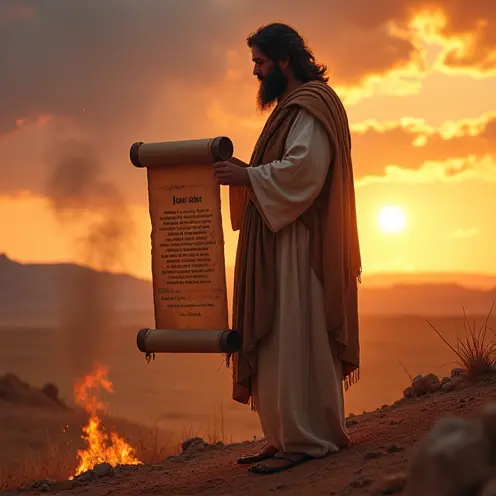Hey there! Today, let’s talk about the books in the Bible that are traditionally attributed to Moses. These books are super important and foundational for understanding the early history of the Israelites and the development of their faith.
First off, there are five books commonly referred to as the “Pentateuch.” This word comes from the Greek, meaning “five scrolls.” These books are Genesis, Exodus, Leviticus, Numbers, and Deuteronomy. Now, let’s dive into each one and see what they’re all about.
Starting with Genesis, it’s like the opening chapter of the whole story. It begins with the creation of the world. You know, “In the beginning, God created the heavens and the earth.” It’s a pretty amazing account of how everything came into being. And then, it tells the story of Adam and Eve, the first humans. They lived in the Garden of Eden, but things didn’t stay perfect for long. They disobeyed God, and that set off a chain of events that led to all sorts of challenges for humanity. Genesis also covers the stories of other important figures like Cain and Abel, Noah and the Flood, and the patriarchs Abraham, Isaac, and Jacob. Each of these stories has its own lessons and significance. For example, Abraham’s willingness to follow God’s call and leave his homeland is a powerful example of faith.
Next up is Exodus. This book is all about the Israelites’ escape from slavery in Egypt. Imagine being stuck in a foreign land, working under harsh conditions, and then suddenly having the chance to break free. That’s what Exodus is about. Moses, who is the main character here, is chosen by God to lead his people out of Egypt. There are some really cool miracles in this book, like the parting of the Red Sea. When the Israelites were being chased by the Egyptian army, God made a path through the water, and they were able to cross safely while the pursuing army was drowned. It’s a story of deliverance and the power of God working on behalf of his people.
Leviticus might sound a bit dry to some people because it deals a lot with laws and rituals. But it’s actually really important. It outlines how the Israelites were supposed to worship God and how to live holy lives. There are rules about sacrifices, offerings, and what makes something clean or unclean. It might seem a bit complicated, but it was all about helping the people stay close to God and understand his holiness. For example, the different types of sacrifices had specific meanings, like the sin offering to atone for wrongdoing or the peace offering to celebrate God’s favor. These laws were meant to guide their daily lives and their relationship with God.
Numbers is another interesting book. It gets its name because it includes a lot of counting and organizing. The Israelites were wandering in the wilderness, and God wanted to know who they had and how to structure their community. There are census records and instructions for how the tribes should be arranged when they camped. It also tells stories about their journey, like the time when they complained about not having enough food and water. God provided for them miraculously with manna from heaven and water from a rock. But there were also times when they disobeyed and faced consequences. It’s a book that shows the ups and downs of their relationship with God during those years in the wilderness.
Finally, we have Deuteronomy. This book is like Moses’ final speech to the Israelites before they were about to enter the Promised Land. He reviews the laws and reminds them of all that God has done for them. He encourages them to stay faithful and to remember the covenant they made with God. There’s a famous passage in Deuteronomy 6:4-9, known as the Shema, where Moses tells the people to love God with all their heart, soul, and strength, and to teach these things to their children. It’s a powerful call to keep their faith alive and to pass it on to future generations.
Now, it’s worth mentioning that while tradition says these books were written by Moses, some modern scholars have different theories. They think parts of these books might have been written or edited by different people over time. But regardless of who exactly wrote them, these books have had a huge impact on Jewish and Christian beliefs. They set the stage for the rest of the Bible and provide a foundation for understanding God’s relationship with humanity.
So, there you have it! The books of the Bible traditionally written by Moses. They cover everything from creation to the laws of worship to the journey to the Promised Land. They’re full of stories, lessons, and insights that have been studied and cherished for thousands of years. Whether you’re reading them for the first time or revisiting them, there’s always something new to discover in these ancient texts.

